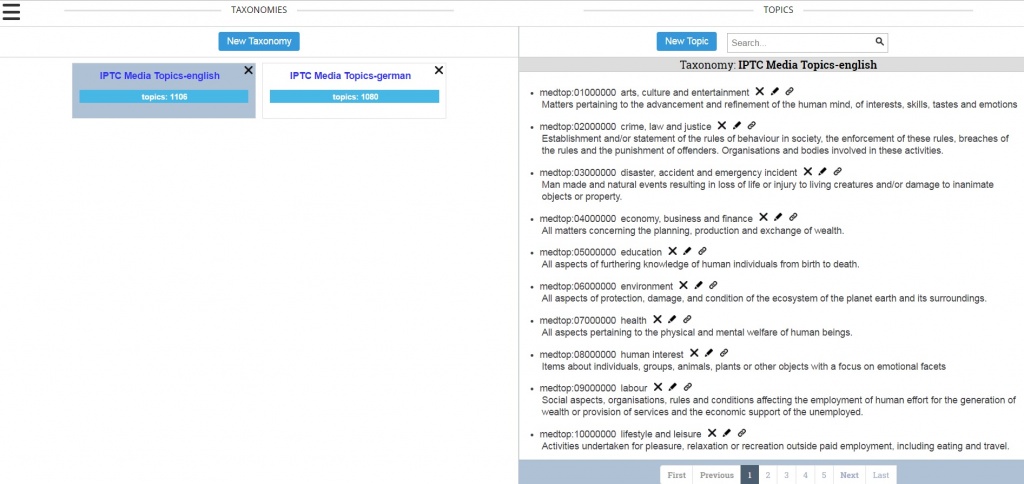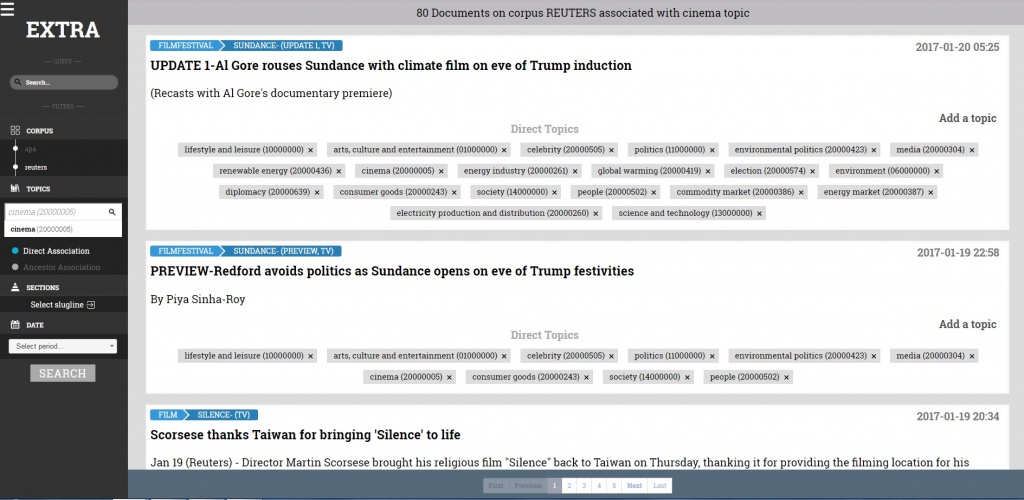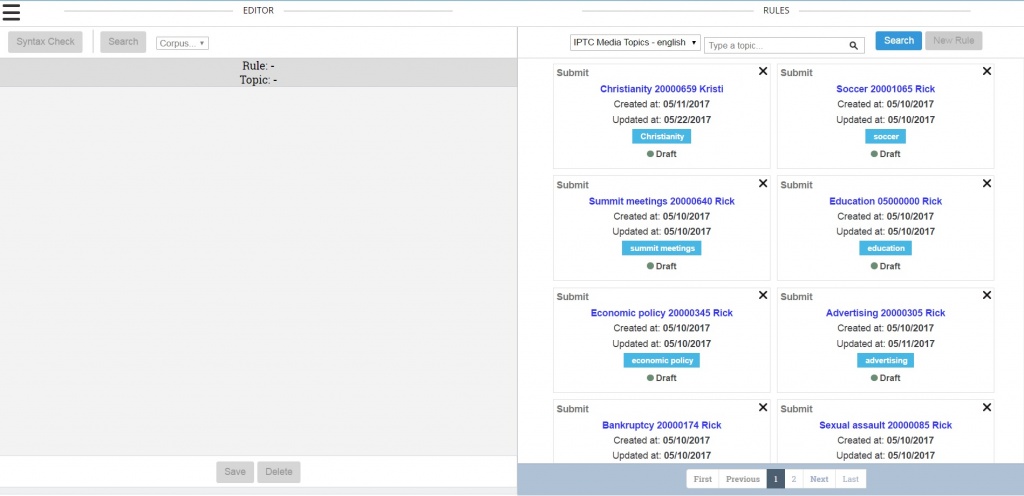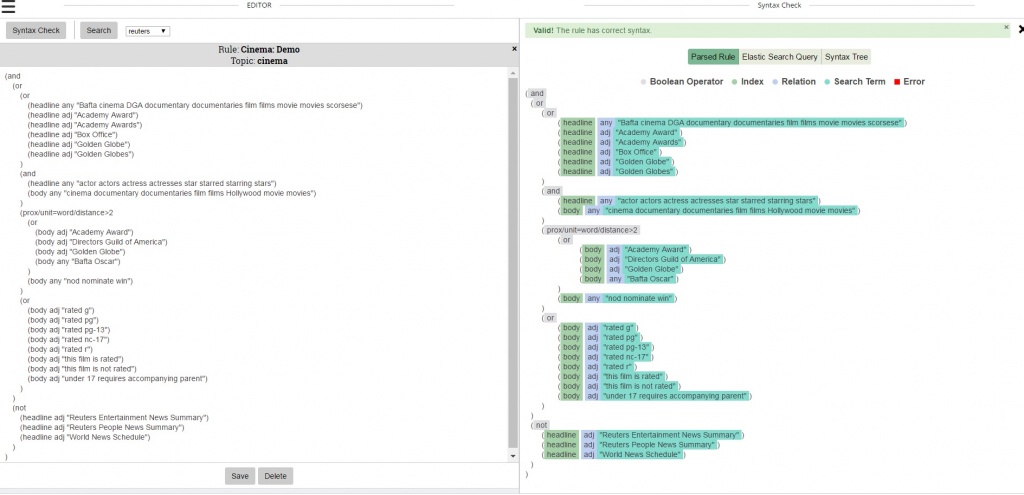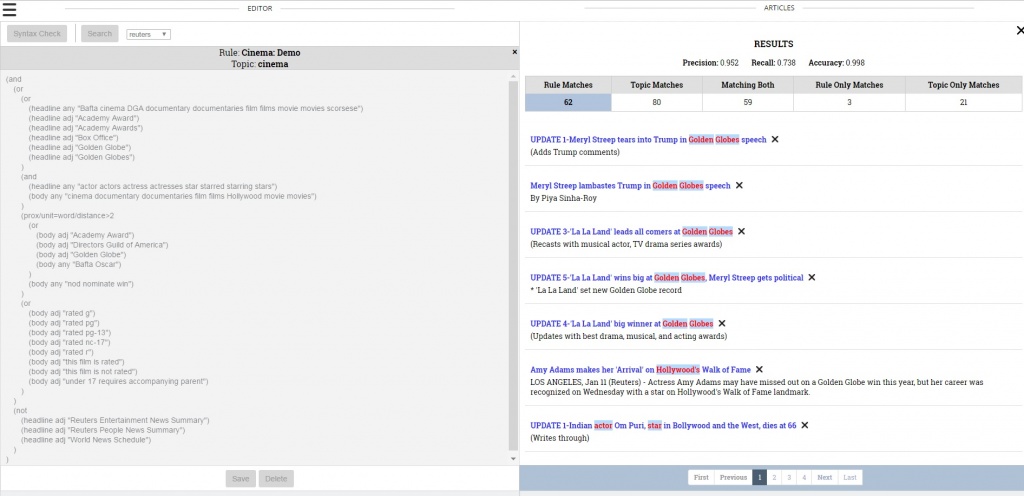Categories
Archives
Our current Managing Director Michael Steidl is retiring in the summer of 2018 after 15 years of dedicated service to the IPTC. The IPTC is now seeking applicants to be the next Managing Director of our organization. Feel free to contact Michael (office@iptc.org) or our Chair, Stuart Myles, (chair@iptc.org) if you have any questions.
Job Opportunity: Managing Director of IPTC
For more information about the position, read the full Managing Director profile.
The IPTC is seeking applications for the next Managing Director of our organization. We are the global standards body of the news media and provide the technical foundation for the news ecosystem. Our mission is to simplify the distribution of information. We develop and promote efficient technical standards to improve the management and exchange of information between content providers, intermediaries and consumers.
The Managing Director, working with the Board and Membership, seeks to broaden adoption of IPTC standards, to maximize information sharing between members and to collaborate with partners across the news and media industry. The ideal applicant will have a strong record of working with news technology, presenting a positive image of an organization and administering a membership or non profit organization.
Learn more about IPTC and read the full Managing Director profile.
Applicants should email a letter of interest, curriculum vitae and contact information for three references to office@iptc.org. We will start considering applications on 1 December 2017.
By Jennifer Parrucci
In leading the way for the creation of a rule-based, multilingual classification system, the IPTC’s EXTRA (EXTraction Rules Apparatus) project is providing a powerful and innovative way for publishers to classify documents using the industry standard IPTC Media Topics taxonomy, as well as tailor rules to their own existing taxonomies. By making these powerful capabilities freely available to the global news publishing community, the EXTRA project catalyzes a variety of innovative outcomes including intelligent aggregation, search and analytics.
In 2016, the IPTC received a €50,000 grant from Google’s Digital News Initiative to create EXTRA , an open source, rules-based, classification system for the annotation of news documents with high-quality subject tags that can be used by publishers to deliver valuable services including, but not limited to, subject related content streams and collections, advertising targeting and content recommendations.
While EXTRA is still in development, attendees of the IPTC Spring Meeting in London were treated to an update and EXTRA demo. The group was shown the rule writer tools and interface and given an example of how to write and test rules. Feedback on these tools is welcomed – the EXTRA project is available via github, including the Extra User Manual, the Extra core code and the Extra API and UI.
A Rules-Based System Improves Tag Consistency Over Other Methods
The fact that EXTRA is rules-based, rather than relying on hand-tagging or statistics-based machine learning systems on the other, is key. EXTRA’s rules-based system allows publishers to improve tag consistency over hand-tagging methods, and provides much more rapid and scalable functionality. EXTRA also allows publishers to adapt their tagging for breaking new and low-frequency topics that cannot be captured by statistical approaches that require numerous annotated results. Users of EXTRA can tweak and customize the extraction rules to suit the needs and patterns of their publication and will be able to either use the IPTC Media Topics as the basic vocabulary or load their own taxonomies into the software. And unlike machine learning, which is a “black box,” EXTRA makes it easier to explain why a given classification was used, and to precisely explain–and correct–mistakes.
A team of IPTC members began by creating a technical requirements document for the project. System requirements included that the tool could be easily configured by given taxonomy, corpora and rules schema, that a comprehensive query language for rules creation was decided upon, that document classification resulted in high precision and recall scores, that the classification could be done in multiple languages, that the system and UI were intuitive and transparent and that everything be available through an open MIT license.
After an extensive search, IPTC hired Infalia in January 2017 to develop the software for EXTRA. Two linguists, one for German and one for English, were hired to create sample rules based on the IPTC Media Topics. The Austrian Press Agency (APA) and Reuters licensed corpora to be used for the EXTRA development process and as examples for users. The working version of EXTRA was completed at the end of June 2017.
Demo of EXTRA: Taxonomy Management Feature
On May 16, 2017 attendees of the IPTC Spring Meeting in London were treated to an EXTRA demo and update about the project. During the demo, the group was shown the rule writer tools and interface and given an example of how to write and test rules.
The group was first shown the taxonomy management feature. For the demo, we pre-loaded the taxonomy management module with the IPTC Media Topics in both English and German. Users are free to use whatever taxonomies they would like. If a taxonomy is selected, one will be able to see the terms in that taxonomy along with their term definitions. The user will also be able to edit and delete terms from that taxonomy.
To assist the linguists in writing rules, they used the document search to see what articles within the corpora returned for each Media Topic. This process provided insights into keywords, phrases and article structures that could alert the engine that an article was about a particular topic, and enabled refinement of the rules or the vocabularies. Users can see the IPTC NewsML-G2 XML of a selected document to see what fields they might want to leverage in the rule.
Sample rules
It was then time to show some sample rules. The EXTRA Query Language enables rule writers to create rules that analyze the text of the documents using ElasticSearch operators plus some custom ones. It allows for stemming by language, querying by a whole document or tokenized by a sentence, paragraph or headline. Rules can be written to target the proximity of words or phrases from each other, whether in the document as a whole or a specific field, the frequency of words or phrases individually or how many words from a list appear.
Examples of simple rules:
A rule that requires that “play” and “bass drum guitar piano” appear in proximity of 3 words
(prox/unit=word/distance<=3
(text_content any/stemming “play”)
(text_content any/stemming “bass drum guitar piano”)
)
A rule that requires that “Merkel” and “Obama” appear in the same paragraph
(prox/unit=paragraph/distance=1
(body = “Merkel”)
(body = “Obama”)
After writing a rule, the user has the ability to syntax check their work.
Then, one can run the rule against a corpus to see how many articles match the rule and were tagged with that term (if it is a pre-existing tag), how many many articles only matched the rule and how many articles matched the rule and not the tag. The user is also shown precision and recall scores. All of this data allows the user to tweak their rule until they are happy with the result.
While EXTRA was still in development at the time of the EXTRA demo, the response from the room was positive and members were eager for the finished product.
Feedback on EXTRA:
The EXTRA project is available via github, including the Extra User Manual, the Extra core code and the Extra API and UI.
Please send your feedback about EXTRA to office@iptc.org.
Jennifer Parrucci is a the group lead for IPTC’s News Codes Working Group and a Senior Taxonomist for NYTimes.com.
A ODRL (Open Rights Digital Language) Candidate Recommendation was released by W3C’s Permissions & Obligations Expressions (POE) Working Group on 26 September: ODRL has been updated to a generic information model that can be customized by any industry or business sector. IPTC is looking for members and experts with experience in defining licensing information in a machine-readable way to help adapt IPTC’s RightsML standard according to the new ODRL Recommendation, which will specifically address the needs of the news industry.
IPTC’s RightsML – https://iptc.org/standards/rightsml/ – is a standard providing a data model for marking up rights expressions about content of all relevant media types in a machine-readable way. The standard was introduced in 2012 and from the start it was built on ODRL – Open Digital Rights Language – a rights expression framework defined outside IPTC. At that time, a W3C Community Group was backing ODRL.
In early 2016 W3C established a formal Permissions & Obligations Expressions (POE) Working Group – https://www.w3.org/2016/poe/charter – to make a W3C Recommendation from the Community Group specifications, and on 26 September a Candidate Recommendation was released. The work on that W3C Recommendation will be closed by the end of 2017, and IPTC will take action to align a next RightsML version with the Recommendation.
IPTC Action: Update RightsML by Synchronising It With the New W3C Recommendation as ODRL RightsML Profile
The transfer of ODRL from a Community Group to a Recommendation approved by the W3C Consortium was not only a copy and paste action. The basic design has not been changed but the status of many actions, constraints or party functions has been changed from “normative” to “non-normative.” The reason was to make the ODRL Recommendation a generic information model which can be easily adapted to the different needs of various business sectors. This has been demonstrated by the range of participants of the W3C Working Group covering needs and interests from media companies and their trade associations, financial data providers, and universities.
The solution for that is called ODRL Profile: it defines all the actions, kinds of constraints, types of involved parties and more which are typical to a business sector and these definitions are add-ons to the basic Information Model of the Recommendation. This also slims down the specifications: businesses behind media assets don’t have to take care of the requirements regarding e.g. scientific papers.
IPTC has taken the role of defining the RightsML Profile of ODRL covering the needs of the news industry. Writing down the definitions fitting into the context of ODRL will not be that hard. Michael Steidl and Stuart Myles of the IPTC are invited experts of the ODRL/POE Working Group and have been active in its development from the start.
The big challenge is to determine which business needs of the news industry should be covered by the actions, constraints or parties defined by the RightsML Profile. To achieve that we need people from IPTC members and experts from other companies who have any experience in defining licensing information in a machine-readable way. Regular conference calls will take place from October 2017 to early 2018 to select and define what should be included to update RightsML Profile.
ODRL: From Candidate Recommendation to the Final Recommendation
On 26 September 2017, W3C published the Candidate Recommendation of ODRL. Links to the relevant W3C documents and other relevant resources are provided in the Details section below.
This opens a test phase until mid-November; in this period the Information Model and Vocabulary documents should be reviewed and comments may be posted. Further, W3C procedures specify that the Information Model and Vocabulary should be implemented into software at least by two parties and be tested against a list of criteria. Any party interested in ODRL and all IPTC members are invited to take this action. For more information contact Michael Steidl (mdirector@iptc.org).
Details for Creating the RightsML ODRL Profile:
- POE Working Group Charter: https://www.w3.org/2016/poe/charter
- POE Working Group home page: https://www.w3.org/2016/poe/wiki/Main_Page
- ODRL Information Model – Candidate Recommendation: https://www.w3.org/TR/2017/CR-odrl-model-20170926/
- ODRL Vocabulary – Candidate Recommendation: https://www.w3.org/TR/2017/CR-odrl-vocab-20170926/
- RightsML Profile outline: http://w3c.github.io/poe/rightsml/ (currently only the section heads are shown)
- The RightsML landing page of the IPTC website: https://iptc.org/standards/rightsml/
- The current RightsML on the IPTC Developer Site: http://dev.iptc.org/RightsML
- The current and small RightsML specification document: http://www.iptc.org/std/RightsML/1.1/RightsML_1.1EP2-spec_1.pdf
- IPTC contact: Michael Steidl – mdirector@iptc.org
IPTC’s Board of directors and Michael Steidl jointly announce that Michael will retire from employed work in mid-2018 and he will step down as IPTC’s Managing Director by then.
The Board has already started to make plans for selecting a new IPTC Managing Director and will provide more details in a separate communication.
Stuart Myles
Chairman of the IPTC Board
Being IPTC’s Managing Director for 15 years is a great experience and I’m happy about having been involved in the development and roll-out of 9 new standards, the new Media Topic taxonomy and other vocabularies; further in setting up new formats of the face -to-face meetings and in the creation of new types of meetings. Being in contact with our membership is also part of the bright side of my IPTC life and I enjoyed spreading the word about IPTC and its work among people knowing only little or nothing about our organisation. It was great to welcome 74 new members in this period.
Unfortunately, even such a great period of life started to apply burden on me, so I’ve decided to retire from employed work next summer. Please look forward to what the future will bring.
Michael Steidl
Managing Director of IPTC
